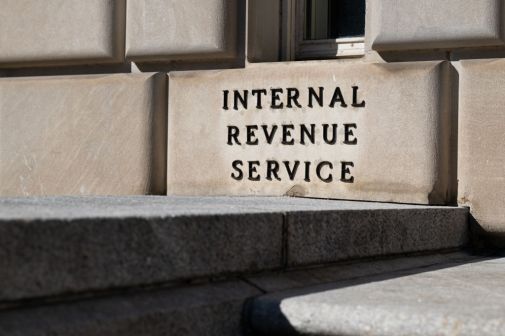IRS’s data-sharing deal with ICE will lead to ‘dangerous’ mistakes, digital rights group argues

A top digital rights group is pushing back on the IRS’s data-sharing agreement with the Department of Homeland Security, writing in a new court filing that the pact violates federal tax code and fails to take into account the real-world consequences of bulk data disclosure.
In an amicus brief filed Tuesday in the U.S. Court of Appeals for the D.C. Circuit, the Electronic Frontier Foundation argued that the “historical context” of the tax code section that ensures confidentiality of returns and return information “favors a narrow interpretation of disclosure provisions.”
EFF also made the case for why the bulk disclosure of taxpayer information — in this case to Immigration and Customs Enforcement — is especially harmful due to “record linkage errors” that set the stage for “an increase in mistaken and dangerous ICE enforcement actions against taxpayers.”
Nonprofit groups sued the Trump administration in March, shortly after the data-sharing deal between the IRS and ICE was announced. Soon after, the tax agency’s then-acting commissioner resigned, reportedly in protest.
In May, a Trump-appointed federal judge refused to block the agreement, allowing the IRS to continue delivering taxpayer data to ICE. The ruling, DHS said in a statement, was “a victory for the American people and for common sense.”
As the D.C. Circuit Court considers the appeal, the Electronic Frontier Foundation wants to make sure that the “historical context” of tax and privacy law is taken into account, according to the group’s legal director.
Corynne McSherry said in an interview with FedScoop that federal law on tax privacy was born in the Watergate era, part of a congressional response to Nixon scandals aimed at protecting “the privacy of all of the data that the government collects on people.”
“Congress was responding to public outcry and outrage over the activities of an essentially lawless executive branch,” McSherry said, “where at least some of the leadership had enemies lists … and wanted to leverage all of the information that is collected about people.”
The courts “don’t have to look at laws in a vacuum,” she continued, “and they shouldn’t, particularly in a situation where, depending on how you read this law, we could have a situation where many, many innocent people are going to be targeted for potential deportation.”
Those 70s-era reforms also included the siloing of data as a bulwark against misuse and abuse, McSherry noted, ensuring that agencies “weren’t just exchanging data randomly at will with each other.” The Trump administration has sought to break down those barriers via executive orders to facilitate “intra- and inter-agency sharing and consolidation of unclassified agency records” and to link agency payment-tracking systems.
EFF believes a governmentwide flattening of data security systems paired with bulk data disclosures opens the door to record-linkage issues. The amicus brief details data scientists’ longheld concerns that “attempts to corroborate partially identifying data collected in one database with partially identifiable data collected in another inevitably leads to errors.”
“Those errors result from such mundane issues as outdated information, data entry errors, and taxpayers or tax preparer submission of incorrect names or addresses,” the brief stated.
McSherry said that from the perspective of a data researcher, it’s “inevitable” that the IRS-ICE deal will lead to confusion and instances of mistaken identity. There are ways to mitigate against that, but it requires “careful comparisons” considered in a slow, deliberate manner — essentially the opposite approach to bulk disclosures. And for an administration hellbent on pushing artificial intelligence in all realms of government, the concern for privacy advocates widens.
“I think this is an area where AI will be particularly dangerous,” McSherry said. “And you really, absolutely need a human in the loop. You need individualized determinations, which is, I think, what the law initially contemplated, and certainly not … determinations via a robot.”
It’s unclear when the appeals court will issue a ruling in the case, but McSherry said taxpayers should “be outraged” regardless of the ultimate decision. EFF believes information is siloed at the government level “for a reason,” and arguments for breaking those silos down in the name of efficiency run counter to the public’s privacy and security interests.
“It’s not more efficient, and it’s not better for Americans, for citizens and residents of this country,” McSherry said. “We want this information to be separated, not for it to be easily combined. And unfortunately, there are a number of folks at the executive branch … [that] want to change those rules, and that’s going to be dangerous for all of us.”






